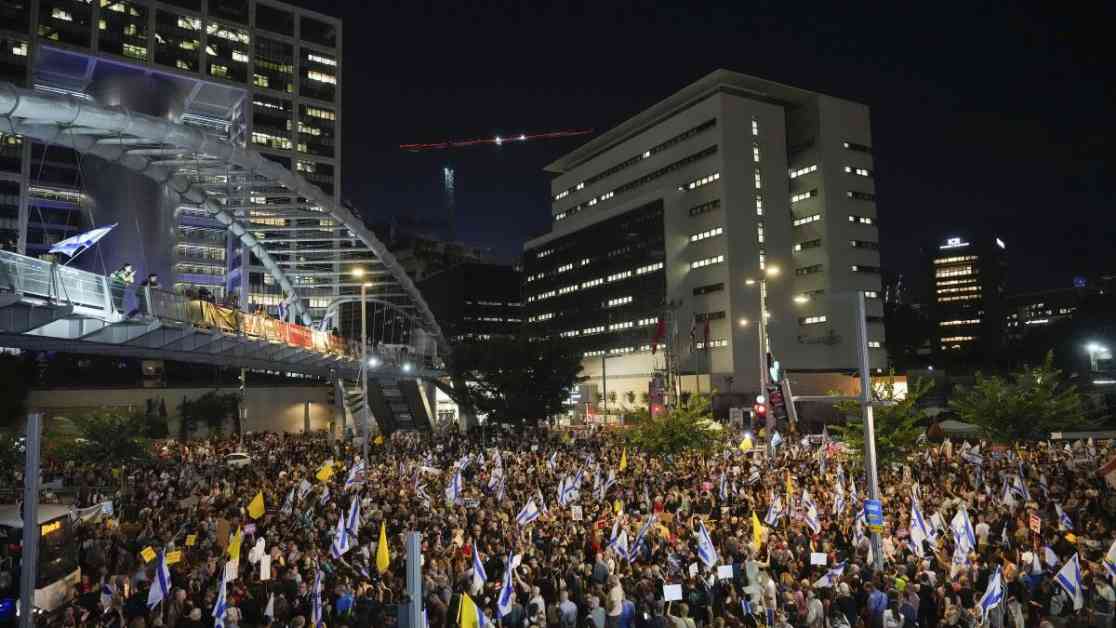TEL AVIV — In the aftermath of the tragic deaths of six Israeli hostages, tensions have escalated between the Israeli government and the Palestinian militant group Hamas, posing a significant challenge for the Biden administration. The recent killings, which included a California-born U.S. citizen among the victims, have further complicated the already delicate negotiations for a cease-fire between the two parties.
Escalating Tensions
For weeks, U.S. officials had been optimistic about reaching a final agreement between Israel and Hamas to halt the fighting in the Gaza Strip and secure the release of hostages held by both sides. However, disagreements over the number of individuals to be released from each side and the complete withdrawal of Israeli troops from Gaza derailed the negotiations before the recent hostage killings. Now, with the tragic loss of lives, the situation has become even more challenging.
The Biden administration is continuing to work on negotiations, but without the involvement of Israeli Prime Minister Benjamin Netanyahu. President Biden expressed dissatisfaction with Netanyahu’s efforts to secure the hostages’ freedom and has shifted the focus of U.S. contacts to colleagues from Egypt and Qatar, who have direct communication with Hamas officials. State Department spokesman Matthew Miller emphasized the urgency of reaching a resolution but refrained from commenting on Netanyahu’s reluctance to accept certain aspects of the proposed deal.
Legal Ramifications
The announcement of terrorism charges against Hamas leaders by the Justice Department further complicates the negotiations. The leaders are facing charges related to the group’s involvement in a cross-border incursion into Israel that resulted in the deaths of approximately 1,200 people. The legal actions against Hamas leaders could impact the ongoing discussions and add a layer of uncertainty to the already complex situation.
With the conflict in its 12th month, Gaza is facing a severe humanitarian crisis. Health officials in the territory have reported at least 41,000 deaths, with the majority of the population displaced and entire cities reduced to rubble. The initial success of a U.S.-brokered cease-fire agreement last November, which temporarily halted the fighting and led to the release of over 100 hostages, now feels like a distant memory in the face of the current challenges.
Families’ Hopes and Political Stalemate
The families of the six slain hostages are expressing hope that the tragic deaths could serve as a catalyst for renewed efforts to free the remaining captives. Amidst a wave of national mourning, there has been a call for both Netanyahu and Hamas to show willingness to compromise and prioritize the lives of the hostages over political agendas.
However, both Netanyahu and Hamas have shown little indication of readiness to make concessions. Mara Rudman, a former special Middle East envoy for the State Department, highlighted the lack of alignment between Netanyahu and Hamas chief Yahya Sinwar’s interests in reaching a cease-fire agreement. She pointed out that both leaders have motivations that do not prioritize ending the conflict, further complicating the negotiation process.
Netanyahu’s recent declaration regarding Israel’s military control over the Philadelphi Corridor, a strategic border strip with Gaza, underscores the challenges in finding common ground. His refusal to negotiate on this issue has raised concerns about the potential impact on the hostages’ fate and the overall peace process. On the other hand, Hamas has issued warnings against any attempts to rescue hostages through military means, raising fears of further violence and bloodshed.
Public Pressure and Political Divisions
The recent public outcry in Israel following the hostage killings reflects the growing pressure on Netanyahu to secure a deal and bring an end to the conflict. Large demonstrations and protests have taken place across the country, with many citizens holding the prime minister accountable for the tragic deaths. While Netanyahu maintains support from his loyal base, there are growing dissenting voices within the security establishment and the public demanding a more diplomatic approach.
As the political divisions within Israel deepen, the prospects for a peaceful resolution remain uncertain. The push for a cease-fire agreement faces obstacles from both sides, with entrenched positions and conflicting interests hindering progress. The ongoing negotiations are crucial in determining the future course of action and the fate of the remaining hostages held in Gaza.
In conclusion, the revival of Israel-Hamas cease-fire talks after the recent hostage killings presents a critical juncture in the long-standing conflict. The Biden administration’s efforts to broker a deal and bring an end to the violence are facing significant challenges, with political, legal, and humanitarian considerations at play. The coming days and weeks will be crucial in determining whether a resolution can be reached and the hostages can be freed from captivity.



























